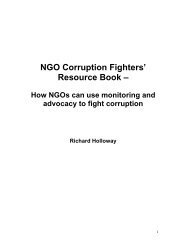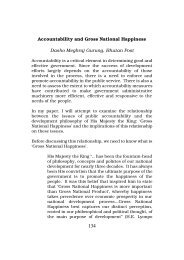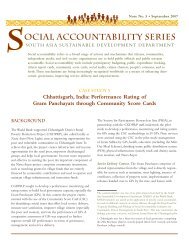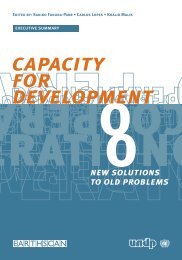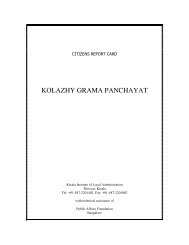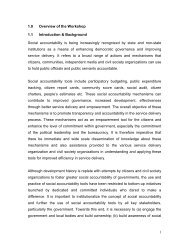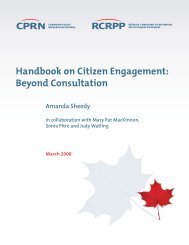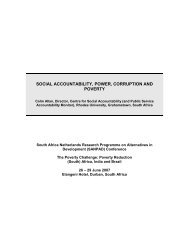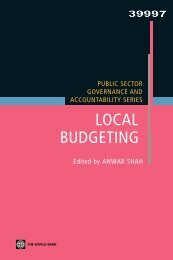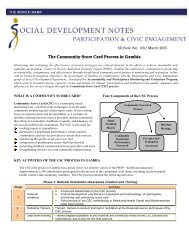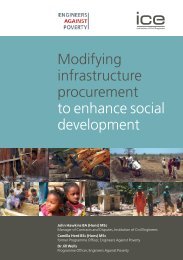Enabling Environment for Social Accountability in ... - SASANet
Enabling Environment for Social Accountability in ... - SASANet
Enabling Environment for Social Accountability in ... - SASANet
You also want an ePaper? Increase the reach of your titles
YUMPU automatically turns print PDFs into web optimized ePapers that Google loves.
1.2 PURPOSE OF THE STUDY<br />
The purpose of this study is: 1) to analyze the conditions that <strong>in</strong>fluence the ability of citizens and their<br />
organizations to promote accountability; 2) to identify priority areas <strong>for</strong> policy, legal, regulatory, and<br />
<strong>in</strong>stitutional re<strong>for</strong>ms to improve these conditions; and 3) to identify areas <strong>in</strong> which capacity build<strong>in</strong>g of<br />
civil society organizations and the Government of Mongolia may be promoted to enhance social<br />
accountability <strong>for</strong> improved governance, social and economic development, and poverty reduction.<br />
The role of civil society actors <strong>in</strong> promot<strong>in</strong>g social accountability is particularly relevant to Mongolia<br />
because of the emphasis the GoM and its development partners place on good governance to enhance<br />
social and economic development. <strong>Social</strong> accountability mechanisms —which strengthen l<strong>in</strong>ks between<br />
the state and citizens—<strong>for</strong>m a critical foundation <strong>for</strong> Mongolia’s ongo<strong>in</strong>g ef<strong>for</strong>t to develop effective and<br />
accountable democratic <strong>in</strong>stitutions. These accountability mechanisms check corruption—<strong>in</strong>creas<strong>in</strong>gly<br />
acknowledged by all stakeholders 7 as a challenge <strong>in</strong> Mongolia. Furthermore, both public governance and<br />
civic engagement are constra<strong>in</strong>ed by sociopolitical legacies of the socialist regime that accustomed<br />
Mongolians to a top-down approach to governance and ensured their passive acquiescence to the state.<br />
Consequently, one of the greatest challenges to the consolidation of Mongolia’s transition to an open<br />
political and economic system is that public officials and citizens must ga<strong>in</strong> a greater understand<strong>in</strong>g of the<br />
role of citizens <strong>in</strong> promot<strong>in</strong>g social accountability, as well as the knowledge to effectively <strong>in</strong>corporate<br />
citizen contributions <strong>in</strong>to governance and development.<br />
F<strong>in</strong>ally, a 2003 Client Survey conducted by the World Bank <strong>in</strong> Mongolia <strong>in</strong>dicated “that there are two<br />
areas where the Bank is seen less positively, and may want to explore <strong>in</strong> further detail: build<strong>in</strong>g capacity<br />
at (the) community level and <strong>in</strong>clud<strong>in</strong>g local communities and civil society <strong>in</strong> strategy development”<br />
(World Bank 2003b:34). This analysis of the enabl<strong>in</strong>g environment <strong>for</strong> civil society participation <strong>in</strong> social<br />
accountability responds to both of these concerns.<br />
1.3 CONCEPTUAL FRAMEWORK: ENABLING ENVIRONMENT FOR CIVIL SOCIETY’S<br />
PARTICIPATION IN SOCIAL ACCOUNTABILITY<br />
Broadly def<strong>in</strong>ed, social accountability is the pursuit of accountability of public <strong>in</strong>stitutions, the private<br />
sector, or even CSOs to societal actors. <strong>Social</strong> accountability mechanisms may be <strong>in</strong>itiated or promoted<br />
by the state, <strong>in</strong>ternational agencies, or <strong>in</strong>dividual citizens. To be effective, however, social accountability<br />
requires the susta<strong>in</strong>ed participation of a strong, vibrant, and autonomous civil society that is active <strong>in</strong><br />
social, economic, and political governance issues. 8 The participation of both civil society actors and<br />
ord<strong>in</strong>ary citizens is commonly referred to as civic engagement.<br />
This study focuses on civil society organizations (CSOs) rather than <strong>in</strong>dividual citizens because CSOs<br />
generally have greater access to resources and represent many citizens who may be seen as a significant<br />
vot<strong>in</strong>g bloc; thus, they are better placed to promote social accountability. A frequent critique of studies on<br />
civil society is that they focus on <strong>for</strong>mally organized and officially recognized NGOs. This study goes<br />
7 See Sant Maral Foundation 2005; UNDP 2000; Zorig Foundation 2004.<br />
8 Although there are many actors <strong>in</strong> the private sector who may hold a government accountable, such as <strong>in</strong>fluential<br />
bus<strong>in</strong>ess leaders, this study focused on the role of civil society actors <strong>in</strong> promot<strong>in</strong>g social accountability. Only when<br />
bus<strong>in</strong>ess leaders have banded together to <strong>for</strong>m a CSO, such as through bus<strong>in</strong>ess associations, would their activities<br />
come with<strong>in</strong> the parameters of this study.



